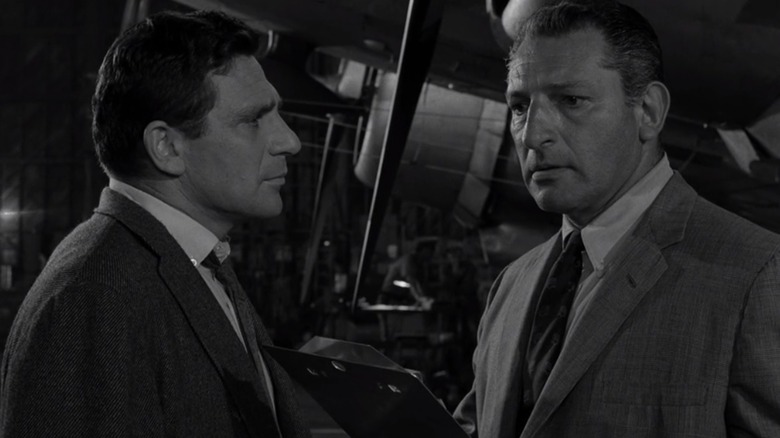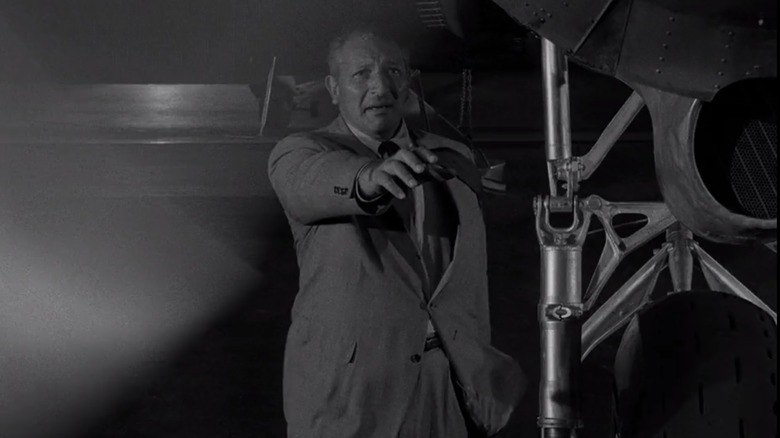The Twilight Zone Episode That Signaled The Beginning Of The Series' End
"The Arrival," the second episode of the third season of "The Twilight Zone," written by series creator Rod Serling himself, poses an unusual problem. The narrative starts with Flight 107, classified as a propeller-driven Douglas DC-3, landing with no crew or passengers, prompting the aviation department to appoint Grant Sheckly (Harold J. Stone) to investigate this curious case. Although Sheckley brings his A-game to the investigation and feels like he's close to the truth, the puzzle adamantly remains unsolved despite the involvement of many talented personnel.
All involved investigators reach a breakthrough when they realize that each one of them, including Sheckly, perceives the plane's seat colors and registration numbers differently. Concluding that the plane is not real, Sheckly tests this hypothesis by sticking his arm in the plane's propeller. When it fails to harm him, all of the staff promptly disappear along with the plane. Unsettled, Sheckly learns that the Flight 107 case never existed but was a hallucination triggered by repressed emotions due to a single unsolved case in his otherwise impressive career.
While "The Arrival" lays the foundation for an intriguing mystery about an aircraft that might be the result of a shared hallucination, the ending feels like a cop-out, as it resorts to the hackneyed "It was all an imagined fantasy" trope. According to Marc Scott Zicree's "The Twilight Zone Companion," a review of the episode by Variety called out the inconsistencies in the episode and expressed concern regarding the longevity of the series:
"The show now seems to be feeding off itself. Last Friday's episode, unless it proves to be an exception in the new skein, doesn't augur well for the future of the series. 'Twilight Zone' seems to be running dry of inspiration."
Was this the beginning of the end for "The Twilight Zone?"
The gradual decay of The Twilight Zone
The criticisms that "The Arrival" faced after it aired were valid. Apart from offering an ending that didn't measure up to the captivating build-up, the episode also had several plot holes that were never accounted for. While this might seem like a one-time miss by Serling, the showrunner admitted in a 1961 interview that he felt "drained of ideas" after penning scripts for countless episodes that were compelling and spectacular:
"I've never felt quite so drained of ideas as I do at this moment. Stories used to bubble out of me so fast I couldn't set them down on paper quick enough — but in the last two years I've written 47 of the 68 'Twilight Zone' scripts, and I've done 13 of the first 26 for next season. I've written so much I'm woozy."
Serling's struggles to retain consistent quality are understandable, and it is a tall order to constantly measure up to a standard levied by our past selves. Fatigue started to creep in, and even other writing talents failed to salvage the situation. Ironically, Serling was compelled to promote one of their new sponsors, the American Tobacco Company, as an antidote to writing blocks in the plugs at the end of every episode.
While Serling perfectly delivered the plug's lines by declaring. "There are no blocks to get in the way of the full pleasure of Chesterfield," reality was much more challenging when it came to capturing the past glory of a series built on sensational writing that was bound to run out of steam one day. Such is life; while the magic of "The Twilight Zone" may have started to fade at this juncture, the actual show will forever be remembered for etching vivid experiences steeped in the esoteric and the unknown.

